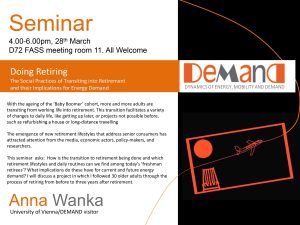Wednesday 28th February, 2018
Doing Retiring – The Social Practices of Transiting into Retirement and their Implications for Energy Demand
Abstract
With the ageing of the ‘Baby Boomer’ cohort, more and more adults are transiting from working life into retirement. This transition facilitates a variety of – more and less severe – changes to daily life, like getting up later, but is also characterized by practices that distinct the transition stage from other life stages, like refurbishing a house or long-distance travelling. Additionally, the emergence of new retirement lifestyles that increasingly address seniors as consumers has increasingly drawn attention of the media, economic actors, policy-makers, and researchers to later life.
This seminar addresses the questions: How is the transition to retirement being done and which retirement lifestyles and daily routines can we find among today’s ‘freshman retirees’? Facing an ageing population, which implications does this have for current and future energy demand?
Beyond presenting insight from gerontological literature, I will discuss data from my postdoc project. In this project I follow 30 older adults throughout their process of retiring from before to three years after retirement. The longitudinal mixed-methods design combines quantitative secondary data analysis, biographic and episodic interviews, daily diaries and photo diaries, and non-participant observations.
The postdoc project is part of the Research Training School ‘Doing Transitions’:


